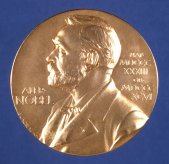Swedish Academy
 Another one of the academies founded by Swedish royalty in the 18th century is the Swedish Academy, set up by Lovisa Ulrika's son to cultivate the Swedish language. The organisation's mostly known for its role in awarding the Nobel Prize for literature. It's also a household name through its dictionary, the SAOL.
Another one of the academies founded by Swedish royalty in the 18th century is the Swedish Academy, set up by Lovisa Ulrika's son to cultivate the Swedish language. The organisation's mostly known for its role in awarding the Nobel Prize for literature. It's also a household name through its dictionary, the SAOL.Being an aesthetic relativist, I don't have much respect for the Nobel Prize for literature. All that such an award says is that the receiver has managed to please eighteen people in Stockholm who are very far from average readers. Their selections are actually kind of a continuing joke in Sweden, greeted by the catch phrase "Yes! Finally!" (Äntligen!) every year when some obscure old man's name is revealed. The prestige of the prize is of course not contingent on that of the academy members, but rests entirely on the amount of cash involved. If Alfred Nobel had just donated money enough to buy a fancy fountain pen for every laureate, then nobody would care about the prize.
But Nobel was an aesthetic absolutist: indeed, his will stipulates that the prize be given to the writer of the "most ideal" works of fiction or poetry. Little could he foresee that the artistic ideals he espoused would one day be (indeed, were already at the time in some quarters) seen as sub-culturally contingent and largely arbitrary. So don't expect me to greet the new laureate, when his (of course it's gonna be a him) name is publicised next week, with much enthusiasm.
The Swedish Academy can have only eighteen members, and they're elected for life. This means that when someone becomes too old or ill to participate, or when a member disagrees with the others so badly that they want to leave the association, then no replacement is possible until they die. So I don't think there have been eighteen fully active members at any one time since the 18th century.
Two members died recently (Östen Sjöstrand and Lars Gyllensten), and the names of their replacements were announced today. Kristina Lugn (58) is a widely read and staged poet and playwright, hugely popular among middle-class ladies of a certain age. Jesper Svenbro (62) is apparently a poet and a Classical Greek philologist, though I have managed to read Swedish books and newspapers for almost 30 years without registering his existence. Actually, he looks suspiciously like a Nobel Laureate for literature. Too bad for him he ended up a member of the Academy.
[More blog entries about books, nobelprize, Sweden; böcker, nobelpriset, svenskaakademin.]
Labels: books, nobelprize



9 Comments:
Alfred Nobel may have had absolute views of what good literature was, but the actual winners as selected by the academy have been a pretty varied lot over the years.
In contrast to you, I try to read something by every Nobel laureate. Even though I still have a long way to go to a complete collection, I think I have found some interesting stuff this way. Among recent finds are Sult by Knut Hamsun and Thousand Cranes by Yasunari Kawabata. On the other hand I also get to read dreck like Pianolärarinnan by Elfriede Jelinek. Mostly, the stuff I read because of this is literature that I wouldn't have read otherwise, and that is a good thing in itself.
As for the lack of women, I looked at the winners from 1990 and up to the present. Four of them are women, meaning 25%. Not good, but not too bad either. I wouldn't be surprised if a woman wins, and my guess is Joyce Carol Oates. I'm not going to bet any money on that, but I'd like the choise.
Given the number of people who have written books through the centuries, it shouldn't be too hard to find a book that you wouldn't have read for any of the usual reasons. Try selecting two random letters, adding a wildcard character and searching for the result in a library database... (-;
That's probably true and occasionally I do select books on grounds that are similarly scientific.
On the other hand I'm still naĩve to think that the Swedish Academy are able to pick out stuff that are above average in some literary sense. That doesn't mean that I have to like it, but at least it should mean that I may find it interesting for some reason.
I'm not sure that naïve is the right word, but in my opinion the qualities you mention are entirely individual. I haven't found the Nobel laureates I'vre read worthwhile, nor was I interested in reading more than 50 pages of The DaVinci Code. In practice, appreciation of art is dictated by social circumstances and largely arbitrary.
T S Eliot.
I rest my case.
I honestly don't know whether that means you agree or you dispute my opinions, which allows me to rest my case. (-;
What are the chances that the Academy chose Ursula K. Le Guin? I just finished her SF-novel "The Telling" (2000), which is very interesting social anthropolgy. It really shows that she is Alfred and Theodora Kroeber's daughter.
Hälsningar
Gunnar
I'd say her chances are nil. She's written a lot of "genre" fiction and she sells lots of books. Both of these traits are unknown among Nobel laurates. But she's one of my favourites.
The only vaguely genre-related writer I've seen mentioned as a potential Nobel candidate is Thomas Pynchon.
Unless I'm mistaken, Toni Morrison sold a fair amount of books before getting the prize.
As for genre-related people being regularly mentioned as potential winners, I'd say Margaret Atwood is another one.
Post a Comment
<< Home